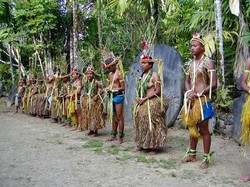如果你想请求他人的原谅,是磕个头还是送上好烟好酒?除此以外,也许你会有更好的主意,但你怎么也不会想到给别人抬去一块大石头,而这正是太平洋上一个小岛上居民的做法。
美式发音 适合泛听
We're looking for an island that's part of 1)the Federated States of Micronesia. The US dollar is used on the island, but this place is famous for its stone money. We're talking discs carved from solid stone. They're big—up to 12 feet in diameter, in fact—and heavy, and you wouldn't use these stones to buy groceries or souvenirs. Rather, they're used for the bigger things in life, like 2)bestowing honor, asking forgiveness or asking your daughter's new in-laws to treat her well.  我们在找的这个岛是密克罗尼西亚联邦的一部分。在这里,美元可以流通,但此地却以石头货币而闻名。我们说的石头货币是指那些从大石头上切割出来的圆盘。这些圆盘很大——直径有12英尺(约3.6米)——而且还很重。不过,你不会用这些石币买食物或纪念品,而是用在生活中更重要的事上,如授予荣誉、请求他人的原谅,或者恳求你新联姻的亲家善待你的女儿等。
我们在找的这个岛是密克罗尼西亚联邦的一部分。在这里,美元可以流通,但此地却以石头货币而闻名。我们说的石头货币是指那些从大石头上切割出来的圆盘。这些圆盘很大——直径有12英尺(约3.6米)——而且还很重。不过,你不会用这些石币买食物或纪念品,而是用在生活中更重要的事上,如授予荣誉、请求他人的原谅,或者恳求你新联姻的亲家善待你的女儿等。
A long time ago in Yap, the legend goes, people were always arguing about trading and doing business, and what to accept as a method of payment. A chief had an idea while looking at the full moon. He said, “We should have something large, round and beautiful like the moon for trading, always there like the moon, something that doesn't break or wear out or get stolen.”
民间传说是这样说的,很久很久以前在雅蒲岛上,人们总是在为交易和生意上的事争论不休,争论究竟应该用什么作为支付工具。有一位族长抬头望月时萌生了一个想法,他说:“我们用来交易的工具应该就像月亮一样又大又圆,还很好看;而且它也像月亮一样,不易碎,不易磨损,也不容易被盗。”
So, the villagers of Yap set out in their canoes to find that something. Some traveled almost 300 miles, to the island of Palau, where they found 3)shimmering limestone. They carved disks of it, with a hole in the middle to let people carry it on poles.
于是,雅蒲岛的村民们就划着他们的独木舟到处找这样的东西,有些人到了近300英里以外的帕劳群岛,正是在那里,他们找到发亮的石灰石。他们把这些石头凿成圆盘,还在中间凿了个洞,便于人们用棍子抬走。
But this isn't just any old money, and not only because it takes 20 strong men to carry each of the heavier pieces.
不过,这些石头货币跟其他古老的货币不同,这不仅仅是因为这些沉重的货币每个都要20个壮汉才抬得动。
John Runman (Yap's Historical Society): Stone money is not used to ask for a wife, for instance. Stone money we can give to somebody to build a house. I can give to another family to ask forgiveness, or apology for a wrongdoing a member of my family has caused onto the other family.
约翰·罗夫曼(雅蒲岛历史协会):比如说,石头货币不用来作聘礼。我们可以用石头货币让他人帮你建一间房子。我也可以用它请求另一个家庭的原谅,或者在自己家人得罪了另外一个家庭后用作歉意的表示。
One of John Runman's colleagues offers to take me to a stone money bank.
约翰·罗夫曼的一名同事带我去看一家石头货币银行。
It's in the middle of a forest. There are no bank windows, no tellers—not even a building—just discs of 4)calcite and limestone, of various sizes, propped along a stone path, leading to a village. I ask if the big pieces of stone money are more valuable.
银行位于树林深处,这里没有柜台窗口,没有出纳员,甚至连建筑物都没有,只有各种大小不一的方解石和石灰石的圆盘躺在一条通往村子的石径边上。我问是不是大块的石头货币价值会更高。
Falownug Kenned (Yap's Historical Society): It depends on the story, and how they get it here to the island. If it cost somebody's life to get it here, it is more valuable than these big ones.
法罗那格·肯那德(雅蒲岛历史协会):货币的价值取决于它背后的故事和来到岛上的经历。如果它是由于某人付出了生命代价后才到岛上的,那它就比那些大的石头更有价值。
So the value of the Yap stone money is subjective and bigger isn't necessarily better. The most valuable pieces are the ones with heroic story attached. Sometimes the pieces are even named after someone—someone who died, trying to bring it to the island, or someone who did some heroic deed that is retold every time the stone money changes hands. In a culture of just a few thousand people, without a written language, the stories behind the stone money are part of Yap's living history.
所以,雅蒲岛上的石头货币的价值依赖于人的主观判断,并不是越大价值就越高。那些伴随着英雄故事的石头是最有价值的。有的时候,有些石头甚至以某个人命名——那是为了把这块石头搬到岛上而献出了生命的人,或者是曾做出过某些英雄行为的人,而他的故事在每次石头易手时都会被重新讲述一次。雅蒲岛只有几千居民,它的文化没有书面文字,石头货币背后的故事正是它鲜活历史的一部分。

